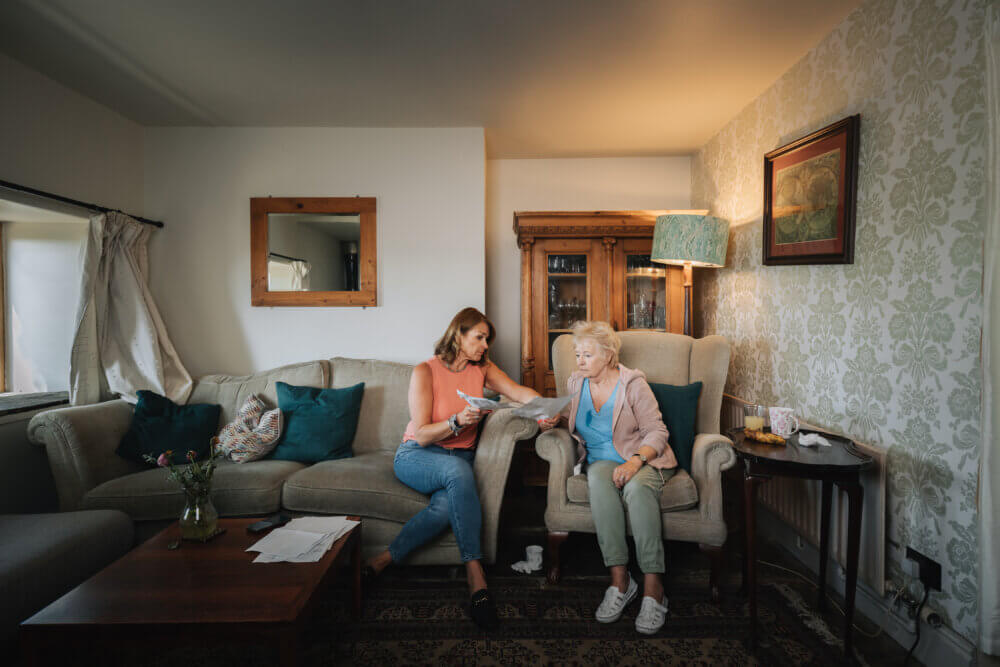Paying for care: who pays what?

Funding guidance for home care
If you are looking into home care options for yourself or a loved one, you may be wondering who pays for home care here in the UK. With some people paying for home care themselves, and others receiving funding and other forms of support – how can you fund your care? We are taking an in-depth look at the different ways to pay for home care, how you might be assessed for this, how to self-fund care if you want/need to, the support available and how to get it, and more. We’ll also do some myth busting on the ‘7 year rule’ when it comes to Inheritance Tax, and cover what to do if you are self-funding and run out of money. At Home Instead, our aim is to help people age positively and in place by bringing expert care to their home. For nearly 20 years, we have been providing the highest standard of care, and creating industry-leading training programmes for our Care Professionals that are accredited by nursing and medical professionals. Today, we are the world’s largest global home care network, supporting over 100,000 older adults with personalised, tailored care at home. So whatever questions you have about paying for home care services, we can help.
How will I be assessed for home care?
If you have been struggling with everyday tasks like getting washed and dressed in the morning or moving around your home, you may have determined that it is time to seek home care services to help you better manage daily life and ensure your safety and wellbeing. Even if you have a good idea of exactly what it is you need help with, the first step in sharing this with other people is to arrange a Care Needs Assessment, in which an assessor will visit your home, chat to you about your daily routine and what you are struggling with, and ask any questions to help determine what home care services you might benefit from – you can read all about the Care Needs Assessment in detail in our guide. Once your Care Needs Assessment is completed, you will be given a Care Plan which details the services that will be used to help you, such as carers, home adaptations, and more. You can read more about this in our guide: All About The Care PlanIf you would like to have this proposed home care funded or partially funded by your local council, they will need to do a means test to find out whether or not you can afford the services that have been suggested for you.

Who pays for home care?
There are several ways you could pay for home care, or have it paid on your behalf, depending on where you live and your individual circumstances.
Option 1: Fully-funded home care
Your local council may agree to fund your home care upon completing a means test, which involves taking a look at your income and savings. If you don’t plan on moving into a care home, the means test will not take into account the value of your home. If your capital amounts to less than £14,250, and as long as you will be left with an income of at least £189.00 per week if you are single and above Pension Credit qualifying age, you may be eligible for funding and your care costs could be fully covered by your local council. You can either allow them to arrange this for you and pay directly, or if you would rather organise your own home care, you can choose to receive payments towards this. If you live in Northern Ireland or Scotland, home care is usually free to those who have been assessed by their local council and deemed eligible, and this is not means tested.
Option 2: Partially-funded home care
In the same way as described above, when you go through the assessment process and are means tested, if your capital amounts to between £14,250 and £23,250, you could still be eligible for financial support from your local council to pay for home care, but you may also have to contribute from your own income too, for example from your pensions. This, along with any tariff income payments you may need to pay, will be explained to you by your local council. You could still be eligible for support and benefits, and we will cover these later in this guide.
Option 3: Self-funded home care
If you live in England and Wales, you may need to pay for your own home care if your savings and assets are above the means test threshold, which is £23,250 in England, or £24,000 in Wales. Essentially, if your income is high enough to cover the cost of your home care without putting you below a certain threshold, you will likely have to pay for this yourself. If you have to (or in some cases you might choose to) self-fund your home care, you will have to seek, arrange and pay for your own care services, however your local council should still provide support and resources to help you do this. You will find more information on paying for care and funding in each country of the UK here.

What about NHS funded care?
In some cases, the NHS might pay the cost of home care through the NHS Continuing Healthcare fund, which aims to help people with complex medical care needs who require ongoing healthcare outside of hospital due to disability, an accident or a major illness. This funding is not means tested. Although it is certainly worth looking into this option (you can learn more here) if you think you may be eligible, keep in mind that very few people will receive funding this way, and your local council should be your first point of contact.

How much does home care usually cost?
The cost of home care varies depending on the personalised services you need and where you live in the country – check out our guide for more information.If you are worried about the cost of home care, we encourage you to reach out to our helpful team at Home Instead so we can discuss what you might need and how much, roughly, this might cost. Often paying for your care can feel daunting, but we have years of experience helping people find the best care plan for their needs and budget, so feel free to reach out for a friendly chat.

How to self-fund or partially-fund home care
If you have decided to self-fund your home care or you are looking to top up the local council funding available to you, you may be wondering about the different ways to do this. There are a number of routes you can take to pay for care, and these include:
- Using your savings and investments
- Combining funds from your pensions or property
- Downsizing your home and using the acquired money to pay for home care
- Using equity release if you own your home, which can offer cash from the value of your property
- Requesting financial help from loved ones
- Looking into what benefits may be on offer to you (more on this below)
- If you release equity from your home or already have savings, you could purchase something called an immediate needs annuity, which means your care fees will be met for as long as necessary
If you are unsure which option is best for you, it is always a good idea to speak to an accredited financial adviser from the Society of Later Life Advisers (SOLLA) who may be able to point you in the right direction.

Will I pay more if I self-fund my care?
This is a common question, but home care costs vary depending on the type of home care service you need and the area you live in. As a rough estimate of how much more you might pay, according to research in 2022 from the Nuffield Trust, in the UK:
Self-funded nursing care at £1,329 per week (on average) compared to self funded personal care at £983 per week (on average)
Nursing care funded by local authorities at £658 per week (on average) compared to personal care funded by local authorities at £609 per week (on average)
*Note: These figures are estimates and will vary by care needs and geographic area
There is thought to be a disparity in the cost of care for those self-funding it versus those being funded by their local authority. The government has discussed plans to require councils to pay providers higher fees for care according to the Fair Cost of Care Policy. This is in the process of being implemented, and should make the cost of care more equal for all.
Is there any support available to pay for home care?
If you need to fund or partially fund your home care, the good news is there are several types of support available. The two main ones to look at if you require home care would be:
- Personal Independence Payment (PIP) – for those underState Pension age
- Attendance Allowance – for those overState Pension age
Personal Independence Payment (PIP)
This is a benefit to help anyone who needs assistance with day-to-day activities or getting around due to a long-term illness or disability. You may be eligible for PIP if:
- You are under State Pension age (if you start claiming this before State Pension age, you will still receive it afterwards)
- You have a long-term illness or disability that makes daily life more challenging, or has forced you to give up work or reduce your hours
- You need help with day-to-day living activities, getting around, or both
- PIP eligibility is not based on your National Insurance contributions and is not means tested, so it doesn’t matter how much you earn or have in savings
How much you receive depends on the level of help you need to do certain things. There is the daily living component and the mobility component, so you may be eligible for one or both of these depending on your condition.
- For the daily living component you could receive a weekly rate of £68.10 or an enhanced rate of £101.75 depending on your circumstances
- For the mobility component, you could receive a weekly rate of £26.90 or an enhanced rate of £71.00 depending on your circumstances
If you want to claim for this, visit the GOV.UK website for more information.
Attendance Allowance
This is a benefit for those over State Pension age who need help with personal care (or need to be supervised for safety) due to an illness or disability.You may be eligible for Attendance Allowance if:
- You are over State Pension age (if you have not yet reached it, you should look into Personal Independence Payment instead – see above)
- You have any type of disability, or physical or mental illness, including sight or hearing impairments or conditions such as dementia
- You could benefit from help with personal care, such as washing or getting dressed, or you need care to keep you safe during the day or at night
- You have needed help for at least 6 months
- You are terminally ill (if this is the case you can claim immediately)
- Attendance Allowance is not means tested, so it won’t matter how much savings or income you have, and claiming won’t affect other benefits you receive
Similar to Personal Independence Payment, there are two rates you might receive depending on how much help you need. Both amounts are typically paid every 4 weeks, and are not taxable. The lower rate is for those who require help either during the day orat night, and this is £68.10 per week, and the higher rate is for those who need help during the day andat night, and this is £101.75 per week.
You can download a claim form from the GOV.UK website.
If you are curious to know about the other benefits you may be eligible for, you can take a look at our guide: Financial Benefits For Pensioners: Topping Up Your Income
What if I’m self-funding home care and my money runs out?
This can be a worry for many people, as it can be hard to plan for how many years you might need home care to continue. Luckily, if you are paying for your own home care and your capital drops to less than the £23,250 threshold in England (£24,000 in Wales), your local council may assist with continuing to fund your care.
You can request an assessment from the council, but be sure to do this at least a few months before your own funds sink below the threshold to avoid you having to dip below this, and to avoid any gaps in your care.

What is the ‘7 year rule’, and is it real?
Over the years there has been a common myth regarding the rules on Inheritance Tax in the UK, which suggested that if you gift someone a property or a large sum of money, the recipient of the gift would be required to pay Inheritance Tax on this if you pass away within 7 years of giving the gift. As a result, lots of people wrongly assume that deprivation of assets (the act of deliberately getting rid of assets to avoid charges or reduce care costs) will not apply to any capital they gave away more than 7 years ago.
This rule is in fact a myth, and does not apply.
This means that your local authority can review as far back as they want to go to discover if you deliberately deprived yourself of assets. Anything you give away to loved ones, whether less or more than 7 years ago, could still be subject to Deprivation of Assets rules.
Ultimately, it comes down to your health condition at the time you gave the gift away, and your intentions in gifting the asset. Speaking to a financial advisor, as mentioned above, may be the best way to determine the ideal way to provide family members with your assets.

At Home Instead, we understand there’s no place like home, so our home care offering aims to help older individuals retain independence and stay in familiar surroundings. We offer a number of bespoke services which can be tailored to your needs, and our Care Professionals are highly trained to deliver the individualised service you need. Reach out to the team at Home Instead to learn more.
We’re an award-winning home care provider and part of a worldwide organisation devoted to providing the highest-quality relationship-led care for older people in their own homes. Arranging care for yourself or your loved one shouldn’t be stressful, so whatever questions you would like answered, feel free to reach out to the Home Instead team to discuss your needs.

Diane WIlliams , Head of Quality & Standards
Before joining Home Instead, I built a comprehensive career in the social care sector, beginning in 1991 as a frontline care worker and advancing to senior leadership roles across both private and voluntary sector businesses.
Throughout my career, I have supported diverse care groups in a variety of settings, including community, residential, nursing, and secure environments. My experience spans working with older adults, including those living with dementia; individuals with physical disabilities and complex, long-term health needs; people with learning disabilities, including autism; individuals with enduring mental health challenges; individuals with current or past substance use and those with forensic backgrounds.
In 2002, I qualified as a social worker and have since maintained my professional registration with Social Work England.